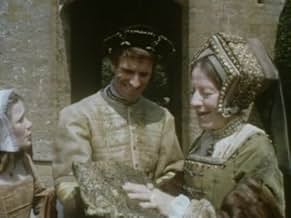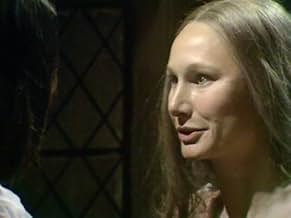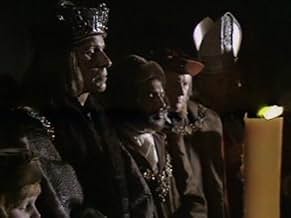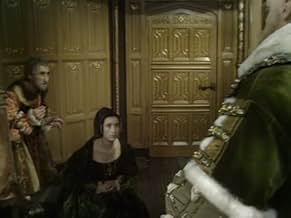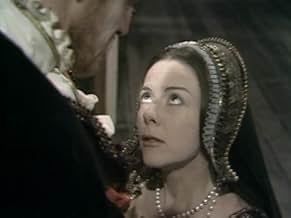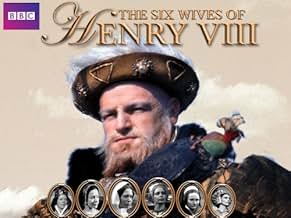The Six Wives of Henry VIII
- Minissérie de televisão
- 1970
- 9 h
AVALIAÇÃO DA IMDb
8,4/10
1,5 mil
SUA AVALIAÇÃO
Adicionar um enredo no seu idiomaA six-episode dramatization of Henry VIII's relationships with each of his six wives. Each episode is devoted to one wife, and is a complete play in itself.A six-episode dramatization of Henry VIII's relationships with each of his six wives. Each episode is devoted to one wife, and is a complete play in itself.A six-episode dramatization of Henry VIII's relationships with each of his six wives. Each episode is devoted to one wife, and is a complete play in itself.
- Ganhou 1 Primetime Emmy
- 7 vitórias e 8 indicações no total
Explorar episódios
Avaliações em destaque
I first saw this BBC production at 13 in 1971, and was simply fascinated. I have seen it several times since, and it's always fresh and interesting to watch. Keith Mitchell is excellent as Henry VIII, and I found no fault with the acting or history of the series. Well-cast, well-acted. I must say that my favorite episodes were Dorothy Tutin as Anne Boleyn and the very unfortunate young Katherine Howard, played by Angela Pleasence. I was surprised that she is the daughter of of Donald Pleasance. All of the episodes are outstanding, and are educational as well. Keith Mitchell plays Henry the VIII with all the conceited, bombastic, loving, hating and self-indulging qualities that history describes him as having. A must-see for lovers of drama, romance, and English History. 10 out of 10 stars easily.
This was one of the most amazing pieces of television/theater. I was 17 when I watched it for the first time and about 10 years ago, acquired the miniseries on VHS. Just recently I was given the DVD set as a gift. I've been re-watching it and I marvel at just how amazing the production and the performances were. At the time Keith Michell played Henry, the actor was in his early 40's yet managed to portray the monarch from age 18 till his death at 56. Simply remarkable and I think Michell is the consummate Henry VIII. As the previous poster, my favorite episodes were Anne Boleyn and Catherine Howard; I didn't know Ms. Pleasence was Donald Pleasance's daughter. I also enjoyed Annette Crosbie's performance; she also portrayed Queen Victoria in the miniseries about Edward VII. All in all, this is one of the finest miniseries ever done on television and I doubt we'll see its equal anytime soon.
This is a set I'd love to own. The costumes are great, and acting is even greater, especially Keith Michel. He brings real depth to Henry and we see him as the interesting, complex man that he was, not just the selfish, bloated glutton of his later years. The court intrigue and politics, and also the costumes are expertly presented and you get a real feel for the times. The only flaw was that the actresses were generally too old for the parts they played, but there aren't many young actresses of this caliber, so one has to suspend disbelief and just enjoy the show. If I had to choose the best performance of the wives, I'd choose Annette Crosbie as Catherine of Aragon.
The best TV miniseries I've ever seen by far. Originally a BBC presentation, it became something of a pop culture phenomenon here in the summer of 1971, when, edited and with a more elegant introduction, it was presented on six Sunday nights. What's best in it is what's most important- the characterization by the six different playwrights of that monstrous old charmer, Henry VIII, and the performance(s) of Keith Michell in the role. I'll give my comments wife by wife. (The title of each episode is the name of the wife.)
CATHERINE OF ARAGON (A) The proximate cause of the English Reformation, the daughter of Ferdinand and Isabella of Spain who had been briefly married to Henry's older brother, whom he married with the necessary papal dispensation, and later wanted to dump because she didn't produce a male heir, which led to all the trouble with Rome. The series gets off to a rocky start. It was a daring ploy of the author to be deliberately tedious in the depiction of the unnoteworthy trials of the young "princess dowager" so as to draw a sharp ironic parallel to the world-shaking trials of the OLD "princess dowager." The satisfaction you feel in getting the point makes up for your initial impatience. All of the wives give fine performances; Annette Crosbie's is one of two which are as great as Michell's. She does full justice to a very great lady. Complaints: her old-age make-up is way overdone (she looks 60-70 instead of 40-50)and this is the only episode compromised by a gratingly poor performance (you'll know whom I mean).
ANNE BOLEYN (A-) Interestingly, the one part of Henry's life which is well-known, his romance with Anne Boleyn, is dispatched here in a minute-long opening interlude. There are some serious weaknesses in the script. The phraseology is "off" a lot- too modern, too soap operatic. ("Love is a most Complete Experience...") It puts its emotional climax (Anne's trial for adultery) at the mid point and then has to trump up unlikely, pointless scenes between the doomed Queen and the Henry's weak yes-man Archbishop Cranmer which come off as actors stalling on a stage because the hands are having trouble wheeling out the block. Henry is reduced to a supporting role in this one and is purely the villain of the piece. The previous Catherine and this Anne are the only wives whose personalities and words have come through in the pages of history; what's most admirable here (and least soap operatic) is that neither the playwright nor the actress (the late Dorothy Tutin)try to gloss over the cruelty and arrogance of the legendary Hussy, and even seem to want to convey the idea that in a sense getting thrown in the Tower and having her head chopped off were the best things that ever happened to her, almost a blessed relief. The supporting players are generally superb in all episodes. Here Anne's brother George and the gentle coward Cranmer are stand-outs.
JANE SEYMOUR (A+) Television at its finest. All but sheer perfection in every way. By far the richest in drama and historical analysis. The playwright ingeniously parlays the little that is known about the sweet country girl (the original Plain Jane)who gave Henry his all-important prince and then quietly crept into her tomb, into an unforgettably touching look at Innocence and Goodness defiled and destroyed even as it's healing and helping (to some degree) Guilt and Badness. The psychological and moral depth matches the emotional- a rare triumph. The portrait it draws of Henry is the most balanced, and Anne Stallybrass is the other actress who attains magnificence. Okay, one tiny flaw: the merry-making scenes are too long.
ANNE OF CLEVES (A-) In the series as in life, a little comedy relief in Henry's ghastly marital career. Elvi Hale is a delight as the supposedly ungainly German princess whom the now grotesque and dilapidated Henry married to deal an alliance with the European Protestants. All that's known of the real Anne is that she was considered ugly and gauche but loved even by Henry (after dumping her in short order) for her simple good nature. Here the "joke" is that behind the scenes Anne is a brilliant political chess player who only plays dumb when expedient. But the good nature is still there, along with a rather anachronistic conviction that "comforting a hurt child is more important than squabbles between Churches", making her probably the only one of the six wives most modern people could like and identify with. Biggest problem: the "informational dialogue" is poured on too thick. The fact that Miss Hale is not just not ugly but actually the only wife who comes close to being beautiful, may be part of the "joke": we have portraits of all six real life wives and she, the "ugly" one, is generally thought to be the only pretty one. The simple sadness of the last shot is unforgettable.
CATHERINE HOWARD (A-) Michell shines as the wreck of his dashing and heroic former self trying to drum up a second wind in his blubbery old hulk when he falls head over heels for a pretty lass whom he makes Queen of England without checking her references... The real Catherine was just a vain and frivolous little ninny who led a sordid life and came to a bad end: to tease a Legend out of this pitiful footnote here Catherine has all the cunning and craft and steely will of Cleopatra and Scarlett O'Hara, and all the rhetorical grandeur of Antigone. The artifice doesn't quite jibe with the facts even as shown. Angela Pleasance is excellent as the witchy little wanton; appropriately, she's attractively nubile but on closer look really not even that pretty. It's a detail which nicely highlights the Die Young/Stay Young Eternally theme. Compelling, but a little too nasty for its own good. The scene in which Catherine banishes the court jester is a nice touch (the clown as sinister symbol of Fate).
CATHERINE PARR (A)The most plodding of the scripts, the least thematically engaging and most history bookish and episodic, so it's a good thing that the dialogue is especially witty and incisive. Another great lady among the six wives in real life, and Rosalie Crutchley does a fine job of projecting her intelligence, humor, kindliness, and honesty, as well as her mortal terror when despite all her golden virtues she almost goes the way of the first Anne and the next-to-last Catherine because of her one fault: she doesn't know when to keep her mouth shut on the subject of Religion in earshot of a husband who made up his own religion up as he went along and had a habit of killing those who wouldn't or couldn't keep up with the developments. Scene of King and Kate's first meeting one of best in the series.
CATHERINE OF ARAGON (A) The proximate cause of the English Reformation, the daughter of Ferdinand and Isabella of Spain who had been briefly married to Henry's older brother, whom he married with the necessary papal dispensation, and later wanted to dump because she didn't produce a male heir, which led to all the trouble with Rome. The series gets off to a rocky start. It was a daring ploy of the author to be deliberately tedious in the depiction of the unnoteworthy trials of the young "princess dowager" so as to draw a sharp ironic parallel to the world-shaking trials of the OLD "princess dowager." The satisfaction you feel in getting the point makes up for your initial impatience. All of the wives give fine performances; Annette Crosbie's is one of two which are as great as Michell's. She does full justice to a very great lady. Complaints: her old-age make-up is way overdone (she looks 60-70 instead of 40-50)and this is the only episode compromised by a gratingly poor performance (you'll know whom I mean).
ANNE BOLEYN (A-) Interestingly, the one part of Henry's life which is well-known, his romance with Anne Boleyn, is dispatched here in a minute-long opening interlude. There are some serious weaknesses in the script. The phraseology is "off" a lot- too modern, too soap operatic. ("Love is a most Complete Experience...") It puts its emotional climax (Anne's trial for adultery) at the mid point and then has to trump up unlikely, pointless scenes between the doomed Queen and the Henry's weak yes-man Archbishop Cranmer which come off as actors stalling on a stage because the hands are having trouble wheeling out the block. Henry is reduced to a supporting role in this one and is purely the villain of the piece. The previous Catherine and this Anne are the only wives whose personalities and words have come through in the pages of history; what's most admirable here (and least soap operatic) is that neither the playwright nor the actress (the late Dorothy Tutin)try to gloss over the cruelty and arrogance of the legendary Hussy, and even seem to want to convey the idea that in a sense getting thrown in the Tower and having her head chopped off were the best things that ever happened to her, almost a blessed relief. The supporting players are generally superb in all episodes. Here Anne's brother George and the gentle coward Cranmer are stand-outs.
JANE SEYMOUR (A+) Television at its finest. All but sheer perfection in every way. By far the richest in drama and historical analysis. The playwright ingeniously parlays the little that is known about the sweet country girl (the original Plain Jane)who gave Henry his all-important prince and then quietly crept into her tomb, into an unforgettably touching look at Innocence and Goodness defiled and destroyed even as it's healing and helping (to some degree) Guilt and Badness. The psychological and moral depth matches the emotional- a rare triumph. The portrait it draws of Henry is the most balanced, and Anne Stallybrass is the other actress who attains magnificence. Okay, one tiny flaw: the merry-making scenes are too long.
ANNE OF CLEVES (A-) In the series as in life, a little comedy relief in Henry's ghastly marital career. Elvi Hale is a delight as the supposedly ungainly German princess whom the now grotesque and dilapidated Henry married to deal an alliance with the European Protestants. All that's known of the real Anne is that she was considered ugly and gauche but loved even by Henry (after dumping her in short order) for her simple good nature. Here the "joke" is that behind the scenes Anne is a brilliant political chess player who only plays dumb when expedient. But the good nature is still there, along with a rather anachronistic conviction that "comforting a hurt child is more important than squabbles between Churches", making her probably the only one of the six wives most modern people could like and identify with. Biggest problem: the "informational dialogue" is poured on too thick. The fact that Miss Hale is not just not ugly but actually the only wife who comes close to being beautiful, may be part of the "joke": we have portraits of all six real life wives and she, the "ugly" one, is generally thought to be the only pretty one. The simple sadness of the last shot is unforgettable.
CATHERINE HOWARD (A-) Michell shines as the wreck of his dashing and heroic former self trying to drum up a second wind in his blubbery old hulk when he falls head over heels for a pretty lass whom he makes Queen of England without checking her references... The real Catherine was just a vain and frivolous little ninny who led a sordid life and came to a bad end: to tease a Legend out of this pitiful footnote here Catherine has all the cunning and craft and steely will of Cleopatra and Scarlett O'Hara, and all the rhetorical grandeur of Antigone. The artifice doesn't quite jibe with the facts even as shown. Angela Pleasance is excellent as the witchy little wanton; appropriately, she's attractively nubile but on closer look really not even that pretty. It's a detail which nicely highlights the Die Young/Stay Young Eternally theme. Compelling, but a little too nasty for its own good. The scene in which Catherine banishes the court jester is a nice touch (the clown as sinister symbol of Fate).
CATHERINE PARR (A)The most plodding of the scripts, the least thematically engaging and most history bookish and episodic, so it's a good thing that the dialogue is especially witty and incisive. Another great lady among the six wives in real life, and Rosalie Crutchley does a fine job of projecting her intelligence, humor, kindliness, and honesty, as well as her mortal terror when despite all her golden virtues she almost goes the way of the first Anne and the next-to-last Catherine because of her one fault: she doesn't know when to keep her mouth shut on the subject of Religion in earshot of a husband who made up his own religion up as he went along and had a habit of killing those who wouldn't or couldn't keep up with the developments. Scene of King and Kate's first meeting one of best in the series.
Impeccable in casting, sets, dialogue, and period feel. All of the principals are magnificent; but the actors who play Stephen Gardiner and Robert Barnes are simply extraordinary. The much-maligned Keith Michell is still the best Henry this century, easily brushing aside Robert Shaw, Richard Burton, and Charles Laughton. Michell's combination of vanity, insecurity, overweening machismo, and determination to stay top dog at all costs is painful but fascinating to watch. This TV series does full justice to all facets of the Tudor period; best of all, it reveals extra magical touches with each re-viewing. Which means, in short, that this is a video which you should buy, rather than rent.
Você sabia?
- CuriosidadesCostume Designer John Bloomfield worked for nearly a year on the mini-series. He spent three months doing basic research at the National Portrait Gallery, Windsor Castle, and various libraries, going through books and papers, and studying paintings and drawings, especially those by Hans Holbein. Apart from the sheer number of costumes involved (three hundred, including twenty-five for Henry), the real challenge was to re-create the richness of court dress. This was accomplished by using screen printing methods with paints and resins on cheap heavy materials. Embossed fabric patterns were achieved by drawing on the basic material with fiber pens, then painting over it.
- ConexõesFeatured in The 24th Annual Primetime Emmy Awards (1972)
Principais escolhas
Faça login para avaliar e ver a lista de recomendações personalizadas
- How many seasons does The Six Wives of Henry VIII have?Fornecido pela Alexa
Detalhes
- Data de lançamento
- País de origem
- Idioma
- Também conhecido como
- Die sechs Frauen Heinrich VIII
- Empresa de produção
- Consulte mais créditos da empresa na IMDbPro
Contribua para esta página
Sugerir uma alteração ou adicionar conteúdo ausente

